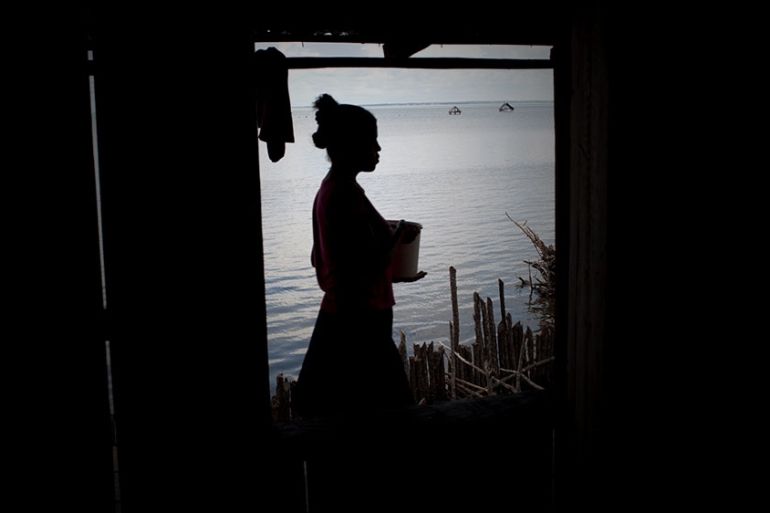‘Letting women decide’: Activists hail Benin abortion vote
Before October 20, abortion was allowed only in specific circumstances; but now, Benin has legalised the practice with the aim of ending unsafe practices.

Littoral, Benin – One afternoon in September 2018, Fatima Ismail found out she was pregnant after a friend told her to do a test. Aged 21 and fearful of what people would think, Ismail decided to get an abortion.
“It’s simple, I wasn’t ready for a child, and the father wasn’t either,” she recalled. “I went to the hospital for another test, and after the doctor confirmed that I indeed was pregnant, I asked ‘for a second option’.”
Keep reading
list of 3 itemsIn Pictures: Protesters demand abortion rights in Latin America
US prepares for Supreme Court showdown on abortion rights
The doctor at the hospital in Benin’s port city of Cotonou immediately understood what she meant and shook his head. “He told me abortion wasn’t an option because he could lose his licence as it was illegal,” Ismail said.
Although there is no official data on unwanted pregnancies in Benin, activists say women such as Ismail are forced to keep pregnancies because of the inaccessibility to safe abortions. The health ministry estimates that complications from unsafe abortion cause about 20 percent of maternal deaths.
For Ismail, that was a “major reason” why she decided to keep her pregnancy. “I had a friend who died after visiting a quack to get an abortion,” she said. “So the thought of that happening to me forced me to keep it. I didn’t want to die like her.”
Landmark vote
Until last week, access to abortion in Benin was legally allowed only if the pregnancy endangered the life of the pregnant woman, was a result of rape, or an incestuous relationship. But in a landmark move on October 20, following a long parliamentary session, the majority of the country’s lawmakers voted to legalise abortion.
Lawyer Dele Ahounou said under the new legislation, women are allowed to have an abortion in the first 12 weeks of pregnancy if it is going to cause a material situation, moral distress, affect their education or professional lives.
“In short, this law puts the power of having an abortion on the person who is pregnant,” Ahounou explained.
Women’s rights activists hailed the parliament’s move.
“This has always been the case: Letting women make decisions for themselves,” Tiwa Tope, a 21-year-old activist, said. “We don’t want a doctor to determine if an individual should get an abortion, or for anyone who isn’t pregnant to dictate what people should or shouldn’t do.”
Amnesty International says that worldwide, an estimated one in four pregnancies every year ends in abortion. Criminalising abortion only makes it less safe, it adds.
Still, with laws that continue to restrict access to safe abortion – which the World Health Organization describes as the attainment of the highest possible level of sexual and reproductive care – women and girls will continue to seek out ways to abort a pregnancy in ways that are not up to medical standards.
‘People as agents’
In Benin, like elsewhere, the legalisation of abortion was opposed by the church, which expressed concern about the parliament’s move. The legislation must be ratified by the country’s constitutional court before it comes into force.
While Benin is not the first African country to adopt such a law – 48 African countries are yet to provide access to safe abortion (where the decision lies on the pregnant person) – it is the first in West Africa to do so.
Thus, Ahounou believes the new law will benefit not only women in Benin but also people in neighbouring countries where access to abortion is illegal.
“This isn’t ideal, but this is an option many are willing to explore. And in the coming months, we’ll see women doing this. Why? Because they can’t walk into a hospital in their home countries for an abortion. Therefore, coming to Benin would be the next step.”
Tope shares the same sentiment with Ahounou.
“All a woman has to do is to meet a social worker who will refer them to an authorised hospital. Or walk into a private or government-owned hospital and meet a doctor in charge,” she said.
Tope added the fight for “reproductive rights” highlighted the difference between “people as objects and people as agents”.
“Between regarding people as pawns on the policy chessboard and recognising them as the players, the decision-makers, the drivers of policy; autonomous individuals intimately concerned with the direction of their own lives,” she said.
“Under these conditions, women especially enjoy better health and live fuller lives.”